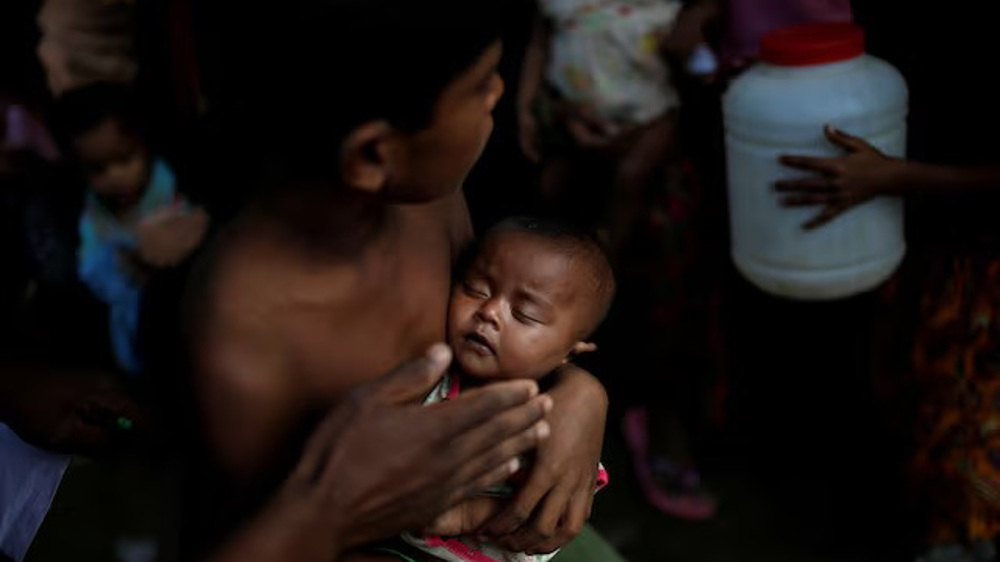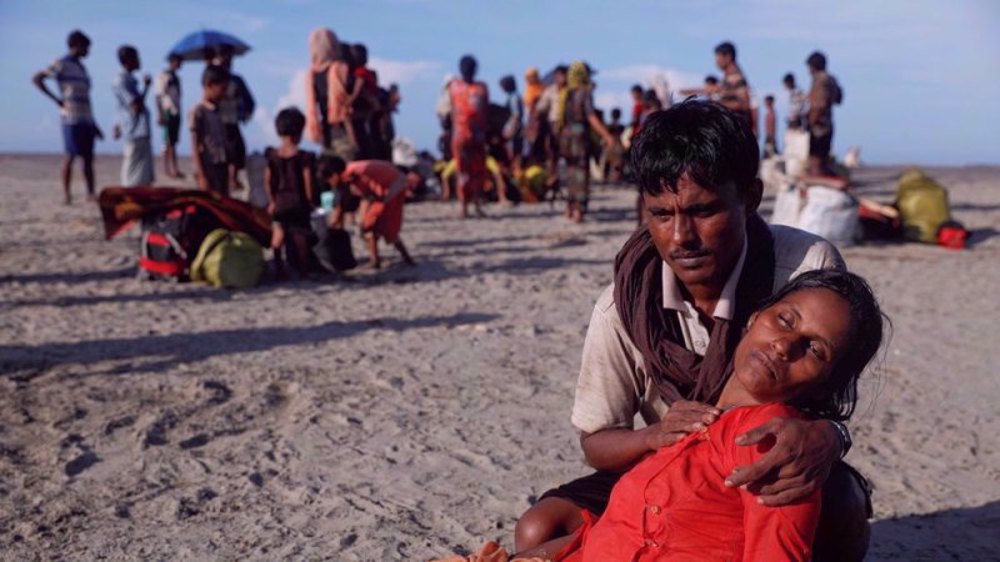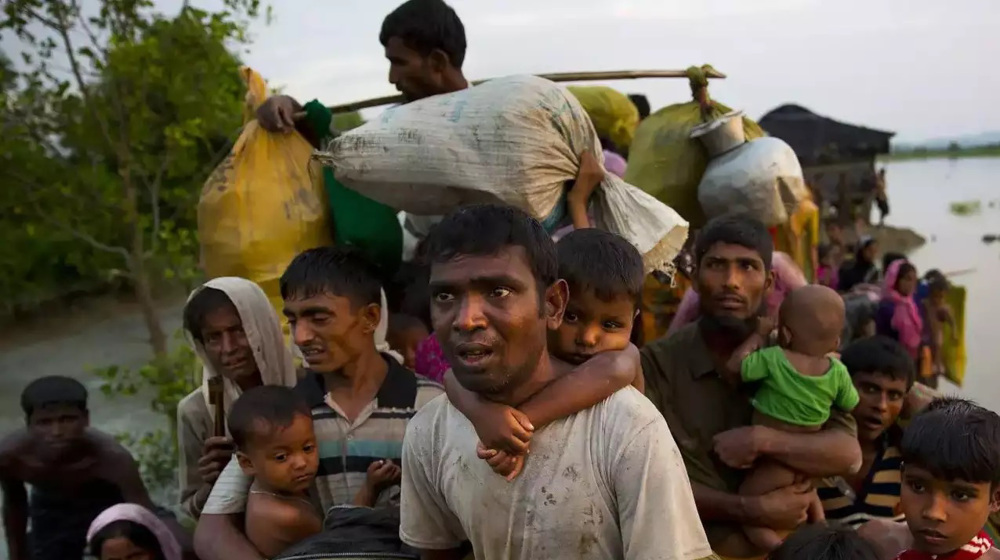'Myanmar’s Islamophobia root cause of Rohingya plight'
Myanmar has long been under scrutiny by the international community over its atrocities against the Rohingya, known by the United Nations as the “most persecuted minority group in the world.” The government denies full citizenship to Rohingya Muslims, branding them illegal immigrants from Bangladesh. The Rohingya, however, track their ancestors many generations back in Myanmar. Press TV has talked to Dr. Maung Zarni, non-resident research fellow at Genocide Documentation Center of Cambodia, as well as Denis Halliday, former assistant UN secretary general, to discuss Myanmar’s continued military crackdown against the Muslim minority group.
Maung Zarni believes that Myanmar has institutionalized the persecution of Rohingya Muslims for the last four decades because it sees them as a “threat” to its national security.
“This is a longstanding, ongoing, institutionalized policy of the Burmese [Myanmarese] military since it took over the country in the early 1960s. There are about 16 different Muslim communities scattered across the country but Rohingya are the only Muslim community with a historical claim to the region where they are today which is right next to Bangladesh,” he said.
“They are the only ones who have their own significant pocket of population in a single concentrated geographic area right next to a populous Muslim country and the Burmese military decided four decades ago [that] having a single Muslim minority next to another large Muslim country is a threat to national security. So that is why they are being targeted, singled out,” the analyst added.
Zarni further maintained that all major institutions that “serve as the pillars” of Myanmar’s society are cleansed of Muslims due to institutionalized Islamophobia.
He went on to say that Myanmar's leader Aung San Suu Kyi is an Islamophobe herself, adding that political parties and organizations have scapegoated the Rohingya Muslim minority to justify “economic hardships and political frustrations” that the country is going through.
More than 18,000 Rohingya members have fled Myanmar to neighboring Bangladesh in recent days. The mass migration has been prompted by a fresh wave of violent attacks, indiscriminate shootings and the burning of their homes.
The humanitarian conditions in Bangladesh are equally squalid, with border guards trying to push them back into Myanmar. Many were forced to stay in a no man's land at the border for days.
Renewed violence erupted on August 25 after dozens of police and border outposts in Rakhine allegedly came under attack by a group claiming to be advocating the Muslim Rohingyas against the government crackdown in Rakhine.
Elsewhere in his remarks, Zarni criticized the international community for not taking a “punitive measure” against Myanmar’s military which is engaged in “genocidal killings” of Rohingya Muslims.
He explained that the inaction on the part of the United Nations stems from the fact that working with the government of Myanmar is “strategically and commercially beneficial” to major powers that control the Security Council.
“This is the classic behavioral pattern of an international order that is driven solely by self-interest under the disguise of democratic liberalism,” he stated, asserting that over the past 100 years, major powers have never made any serious endeavors to end “genocide and mass atrocities.”
Zarni further concluded by saying that the Organization of Islamic Cooperation (OIC) should start pushing its allies in the West to call for a Security Council meeting to stop the ongoing violence against the Rohingya Muslims, suggesting that Saudi Arabia, Iran and Turkey work together to get better results.

Meanwhile, Denis Halliday, the other panelist on the program, said the reason why the United Nations has failed to respond to the Rohingya’s plight is that the five veto powers that control the UN Security Council have “vested interest” in Myanmar.
He also reiterated that the United Nations is “lost” as an organization and does not have the power to make any difference until its member states recognize their commitment to the UN Charter and set aside their interests which are secured through selling weapons and starting wars.
The analyst further said that what is happening to the Rohingya Muslims is an “appalling tragedy,” emphasizing that all people should stand up and speak out against the persecution of the minority group.
The Rohingya have been under a military siege in Rakhine since October 2016, when the government used a deadly militant attack on border guards as a pretext to enforce the siege. There have been numerous eyewitness accounts of summary executions, rapes, and arson attacks by security forces against the Muslims since the crackdown began.
Halliday pointed out that the Rohingya have been citizens of Myanmar for a century or more and revoking their citizenship is “a violation of their human rights.”
According to the expert, the Muslim world as well as the Security Council should step in and stop this violence by working out a solution that serves the interests of both Myanmar’s government and the Rohingya Muslims.
Explainer: Jam-e Jam 1 – Iran’s giant leap into geostationary orbit and a new broadcasting era
Iran says entered talks with US with 'result-oriented approach'
Iran FM, IAEA chief meet ahead of indirect talks with US
Israeli soldier admits to murder, rape in Gaza during live stream
VIDEO | Pakistan protesters condemn US-Israel threats, mourn mosque victims
VIDEO | Press TV's news headlines
Tehran slams US ‘inhumane’ sanctions against Cuba
Two Palestinian children killed in PA ambush; Hamas slams attack as ‘black mark’














 This makes it easy to access the Press TV website
This makes it easy to access the Press TV website